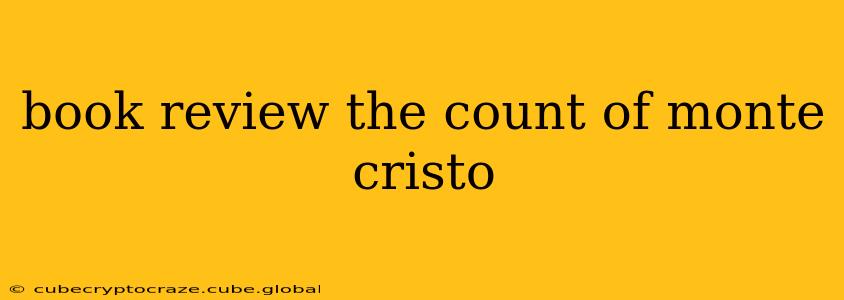Alexandre Dumas's The Count of Monte Cristo is more than just an adventure novel; it's a sprawling epic of betrayal, revenge, and redemption, captivating readers for nearly two centuries. This review delves into the compelling narrative, unforgettable characters, and enduring themes that solidify its place as a classic of world literature.
A Tale of Wrongful Imprisonment and Exquisite Revenge
The story centers around Edmond Dantès, a young sailor on the cusp of happiness, betrayed by envious rivals and unjustly imprisoned on the island of Monte Cristo. Years of confinement transform him, not only physically but also mentally and spiritually. He emerges from his ordeal, not as a bitter man consumed by hatred, but as a cunning and resourceful Count, armed with the knowledge and wealth acquired during his imprisonment. This transformation is central to the novel's appeal, showcasing the power of resilience and the complex nature of human nature.
Unforgettable Characters and Their Intricate Webs
Dumas masterfully crafts a cast of richly developed characters, each with their own motivations and flaws. From the scheming Fernand Mondego and Danglars, whose jealousy fuels Edmond's downfall, to the unwavering loyalty of Haydée and the compassionate Mercedes, each character contributes to the intricate web of relationships that drives the plot forward. The depth and complexity of these characters allow the reader to empathize with both the victims and the perpetrators, adding layers of moral ambiguity to the tale.
Exploring the Themes of Justice, Revenge, and Redemption
The Count of Monte Cristo is not simply a tale of revenge; it's a profound exploration of justice, both its failings and its eventual, albeit sometimes harsh, triumph. Edmond's meticulously planned revenge is not without its moral complexities. While satisfying for the reader to witness the downfall of his betrayers, the novel also subtly questions the nature of justice and whether revenge truly brings lasting peace. The story ultimately delves into the theme of redemption, suggesting that even after acts of vengeance, the possibility of forgiveness and a new beginning exists.
Frequently Asked Questions (FAQs)
Is The Count of Monte Cristo a long book? Yes, it is a lengthy novel, which can be both a benefit and a drawback. The length allows Dumas to fully develop his characters and plotlines, but it can also present a challenge for some readers. However, the engaging narrative and compelling characters make it a rewarding read, even with its considerable length.
What makes The Count of Monte Cristo so popular? Its enduring appeal lies in its timeless themes – betrayal, revenge, justice, and redemption – which resonate with readers across generations. The thrilling plot, vividly drawn characters, and exciting adventures make it a captivating read. Additionally, the novel's exploration of social injustices and the complexities of human nature adds intellectual depth.
Is The Count of Monte Cristo suitable for all ages? While the novel's adventure and intrigue elements make it appealing to younger readers, some mature themes, such as betrayal, imprisonment, and revenge, might be more appropriate for older teens and adults.
Conclusion: A Must-Read for Any Literature Enthusiast
The Count of Monte Cristo remains a compelling and enduring masterpiece. Dumas's masterful storytelling, memorable characters, and exploration of complex themes ensure that this novel will continue to captivate readers for generations to come. While its length might be daunting, the rewards of immersing oneself in this intricate and thrilling tale are undeniable. It's a must-read for anyone who appreciates gripping narratives, richly drawn characters, and a profound exploration of the human condition.
